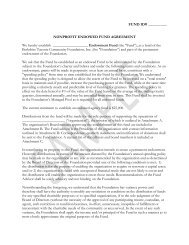Attorney General's Guide for Board Members of a ... - Mass.Gov
Attorney General's Guide for Board Members of a ... - Mass.Gov
Attorney General's Guide for Board Members of a ... - Mass.Gov
- No tags were found...
You also want an ePaper? Increase the reach of your titles
YUMPU automatically turns print PDFs into web optimized ePapers that Google loves.
The <strong>Attorney</strong> General’s <strong>Guide</strong> <strong>for</strong> <strong>Board</strong> <strong>Members</strong> <strong>of</strong> a Charitable OrganizationIN SHORT:Any conflict transaction should be scrutinized veryclosely by the board, both because <strong>of</strong> the dynamic itcreates within the board and because <strong>of</strong> the predictableskepticism with which the public and regulators will viewthe transaction, no matter how scrupulously a carefulpolicy is followed.VII. PAY CLOSE ATTENTION TO FINANCIAL MATTERSAs a board member you have primary responsibility <strong>for</strong> making sure that thecharity is financially accountable, that it is not allowing charitable assets to be usedinappropriately or diverted to private interests, that it has mechanisms in place to keep itfiscally sound, and that it is properly using any restricted funds it may have.THIS MEANS:• The board should make sure that a realistic annual budget is developed.• The budget should be developed early enough that the entire board can beinvolved in its review and approval be<strong>for</strong>e the beginning <strong>of</strong> the fiscal year.• The board should be sure that the charity has adequate internal accountingsystems and controls. At a minimum, the board should discuss and approve alldelegations <strong>of</strong> its signatory authority, put these delegations in writing, and reviewthem annually. In addition, the board should consider requiring board actionon large or especially significant contracts or grants, and on all transactionsinvolving real estate, borrowing, or sale/disposal <strong>of</strong> large assets. <strong>Board</strong> membersshould expect management to produce timely and accurate income and expensestatements, balance sheets, and budget status reports, and should expect toreceive these in advance <strong>of</strong> board meetings. These reports ought to be easilyunderstood by the majority <strong>of</strong> board members and board members should takean active role in reviewing and questioning the in<strong>for</strong>mation in them.• The board should require periodic confirmation from management that allrequired filings (such as tax returns and the <strong>Mass</strong>achusetts Form PC) are up-todateand that employee withholding taxes and insurance premiums are beingpaid when due.Page 9





